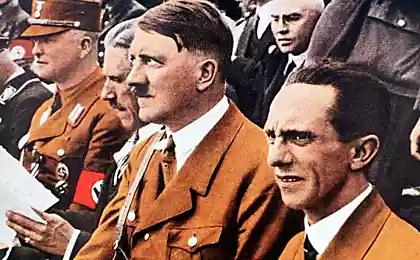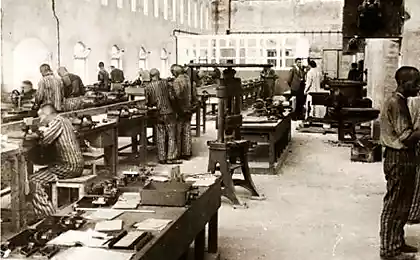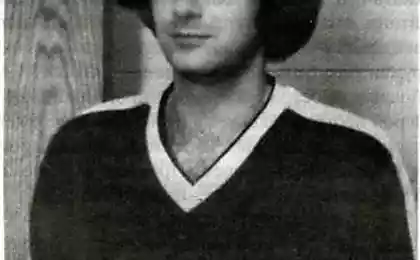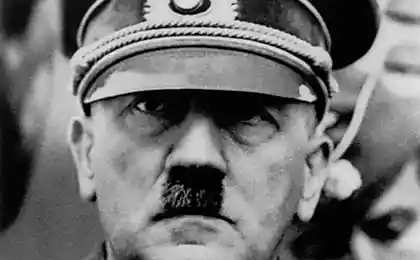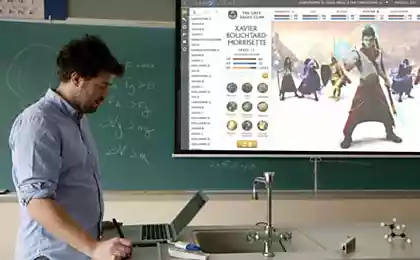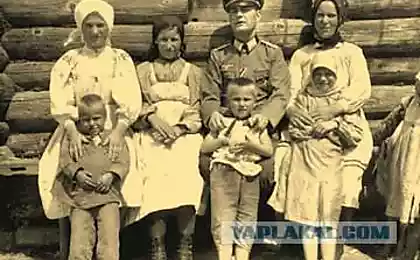1190
6 lessons from the Nazis, AS TO PERSONS FROM BIOMASS
As the Nazi system breaks down the individual as opposed to the individual system and monstrously destructive psychological field, what are the strategies used by the Nazis to make individuals do biomass

In preparation for a public lecture on the psychology of the individual, I was looking through excerpts from the book of the psychoanalyst Bruno Bettelheim "enlightened heart." In it, he describes his experience of concentration camp prisoners at Dachau and Buchenwald, where he was in 1938-1939, and the experience of other people involved with the destruction of human dignity, later, when the Nazis were "opened" at full capacity. I take notes, extracts, and eventually turned this article.
I was interested in the psychological aspect of what happened in the concentration camps. As the Nazi system breaks down the individual as opposed to the individual system and monstrously destructive psychological field, what strategies to use and how they deform. In the end, the person - this is our adaptation strategies exist around the world, and on what is this world, in many (but not all) depends on what we have. - Writes Ilya Latypov.
Let's start ...
The Nazi system in 1938-1939, - residence time Bettelheim in Dachau and Buchenwald - has not been aimed at the total extermination, although life then, too, were not considered. She was focused on "education" slave labor: the perfect and obedient, did not think about anything except the mercy of the owner, which is not a pity to put in consumption. Accordingly, it was necessary from a resisting adult person to make a frightened child, force infantilize man achieve his recourse - until the child or even to an animal, living biomass, without personality, will and feelings. Biomass is easy to manage, it does not cause sympathy, it is easier to despise and she obediently go to the slaughter. That is, it is convenient for the hosts.
Summarizing the main psychological strategies of repression and breaking the individual described in the work of Bettelheim, I was singled out for himself and made a number of key strategies which, in general, are universal. And in different variations, they repeated and repeated at almost all levels of society, from the family to the state. The Nazis only to collect it all in a single concentrate violence and terror. What kind of methods for converting biomass personality?
Rule 1: Make the person to engage in meaningless work.
One of the favorite activities of the SS - to force people to do the work of a completely meaningless, and the prisoners realized that it does not make sense. Carry stones from one place to another, dig holes with their bare hands when the shovel lying nearby. What For? "Because I said so, jew face!».
(How is this different from "because they have" or "to carry out your business and not think»?)
Rule 2. Enter the conflicting rules violations are inevitable.
It is right to create an atmosphere of constant fear of being caught. People were forced to negotiate with the guards, or "capo" (SS helpers from among the prisoners), falling from them in complete dependence. It unfolds a large field for blackmail: overseers and Kapo could pay attention to the violation, and could not pay - in exchange for certain services.
(Absurd and contradictory parental demands or state laws - a complete analogue).
Rule 3. Enter collective responsibility.
Collective responsibility blurs personal - it's long been known rule. But in an environment where the cost of failure is too high, the collective responsibility of all members of the group turns to the guards one by one. Himself team becomes an unwitting ally of the SS and the camp administration.
Often, obeying whim, the SS gave another senseless order. The desire to obey eats into the psyche so much that there were always prisoners who comply with the order for a long time (even when the SS forgot about it in five minutes), and forced others to do so. So, once the warden ordered a group of inmates to wash the shoes inside and out with soap and water. Boots becomes hard as stone, rubbed his legs. The order will never be repeated. However, many long time in the camp prisoners continued every day to wash the inside of his boots and cursed anyone who did not, for negligence and dirt.
(Principle of group responsibility ... When "all guilty", or when a specific person as a representative only see stereotyped group, not as a spokesman of opinion).
These are the three "preliminary rules". Shock link are the following three crushing already prepared person in the biomass.
Rule 4. Make people believe that nothing from them depends.
To do this: create an unpredictable environment in which it is impossible to plan anything and make people live by the instructions, preventing any initiative.
Group of Czech prisoners killed since. For some time they have identified as a "noble" entitled to certain privileges given to live in relative comfort without work and deprivation. Then, suddenly threw the Czechs to work in a quarry, where there were the worst working conditions and the highest mortality rate, while cutting the diet. Then back - in a good home and light work, a few months later - again in the pit, etc. In the living there was none. The total lack of control of his own life, is impossible to predict what you reward or punish, cuts the ground from under their feet. Personality is simply no time to develop adaptation strategies, it is completely disorganized.
"Human survival depends on its ability to retain a certain area of free behavior, keep control of some important aspects of life, in spite of the conditions, which seem to be intolerable ... Even a small, symbolic to act or not to act, but on their own, can survive I and people like me ».
B. Bettelheim
Toughest schedule constantly urged people. If one or two minute delay in the washing - late for a toilet. Linger with cleaning his bed (while in Dachau were still beds) - you will have no breakfast, which is already scarce. The rush, the fear of being late, for a second stop and think ... Constantly you customize different supervisors: the time and fear. Do not you plan the day. Do not you choose what to do. And you do not know what will happen to you then. Punishments and rewards were without any system. If at first the prisoners thought that the good work will save them from punishment, then comes the understanding that there is no guarantee of sending produce stones in a quarry (the lethal occupation). And awards for a reason. It's just a matter of whim SS.
(Authoritarian parents and organizations are very profitable this rule, because it ensures the absence of activity and initiative on the part of recipients of messages like "anything from you does not depend", "Well, what you have achieved," "it has been and will always be»).
Rule 5. Make people pretend that they did not see or hear.
Bettelheim describes this situation. The SS man beating a man. Passes by a column of slaves who, noticing the beating, turning heads in unison toward and sharply accelerated, his whole appearance indicating that "no notice" of what is happening. The SS man, not looking up from his work, shouting "Well done!". Because prisoners demonstrated that learned the rule "do not know and do not see what is not allowed." And the prisoners intensified the shame, a sense of powerlessness and, at the same time, they unwittingly become accomplices SS man playing his game.
(In families where violence flourishes, often the situation when someone from the family sees and understands, but pretends that he does not see and does not know. For example, a mother whose child is exposed to ... abuse by the father / stepfather ... In totalitarian states usually "all know, but pretend ..." - the most important condition of their existence)
Rule 6. Make people to cross the last line inside.
"To avoid becoming a walking corpse, and remain human, even humiliated and degraded, had all the time to know where that line, because of which there is no return, hell, beyond which can not be derogated under any circumstances, even if it is life threatening . Realize that if you survived the transition cost for this feature, it will continue life lost all meaning ».
B. Bettelheim
Bettelheim leads a very visual, a story about "the last line." One SS man drew attention to the two Jews who "skive". He made them lie down in a muddy ditch, called a Polish prisoner from the neighboring brigade and ordered to bury fallen into disfavor alive. Pole refused. The SS man began to beat him, but the Poles continued to refuse. Then the warden told them to change places, and the two men were ordered to bury the Pole. And they began to bury their companion in misfortune without hesitation. When the Pole nearly buried, the SS ordered them to stop, dig it back, and then lay down in the ditch itself. And once again he ordered them to bury the Pole. This time he obeyed - or revenge, or thinking that they too will spare the SS at the last minute. But the warden not pardoned, he boots stamp down the earth over the heads of the victims. Five minutes later, they - one dead and the other dying - were sent to the crematorium.
The result of the implementation of the rules:
"Prisoners are constantly inspires SS assimilated the idea that they have nothing to hope, to believe that they can not influence their position - such prisoners became, literally, walking corpses ...».
B. Bettelheim
The process of transformation in these zombies was simple and visual. First, people stopped to act on his own: he had no internal source movement, whatever he did, was determined pressure from the guards. They automatically execute orders, without any selectivity. Then they cease to lift his legs when walking, very characteristic shuffling began. Then they started to look only ahead. And then comes death.
The zombie people turn when discarded any attempt to understand their own behavior and come to a state where they could take anything, everything that comes from outside. "Those who survived realized what had not realized they have the latest, but perhaps the most important human freedom - in all circumstances, to choose their own attitude to what is happening." Where there is no self-relationship begins zombies.

In preparation for a public lecture on the psychology of the individual, I was looking through excerpts from the book of the psychoanalyst Bruno Bettelheim "enlightened heart." In it, he describes his experience of concentration camp prisoners at Dachau and Buchenwald, where he was in 1938-1939, and the experience of other people involved with the destruction of human dignity, later, when the Nazis were "opened" at full capacity. I take notes, extracts, and eventually turned this article.
I was interested in the psychological aspect of what happened in the concentration camps. As the Nazi system breaks down the individual as opposed to the individual system and monstrously destructive psychological field, what strategies to use and how they deform. In the end, the person - this is our adaptation strategies exist around the world, and on what is this world, in many (but not all) depends on what we have. - Writes Ilya Latypov.
Let's start ...
The Nazi system in 1938-1939, - residence time Bettelheim in Dachau and Buchenwald - has not been aimed at the total extermination, although life then, too, were not considered. She was focused on "education" slave labor: the perfect and obedient, did not think about anything except the mercy of the owner, which is not a pity to put in consumption. Accordingly, it was necessary from a resisting adult person to make a frightened child, force infantilize man achieve his recourse - until the child or even to an animal, living biomass, without personality, will and feelings. Biomass is easy to manage, it does not cause sympathy, it is easier to despise and she obediently go to the slaughter. That is, it is convenient for the hosts.
Summarizing the main psychological strategies of repression and breaking the individual described in the work of Bettelheim, I was singled out for himself and made a number of key strategies which, in general, are universal. And in different variations, they repeated and repeated at almost all levels of society, from the family to the state. The Nazis only to collect it all in a single concentrate violence and terror. What kind of methods for converting biomass personality?
Rule 1: Make the person to engage in meaningless work.
One of the favorite activities of the SS - to force people to do the work of a completely meaningless, and the prisoners realized that it does not make sense. Carry stones from one place to another, dig holes with their bare hands when the shovel lying nearby. What For? "Because I said so, jew face!».
(How is this different from "because they have" or "to carry out your business and not think»?)
Rule 2. Enter the conflicting rules violations are inevitable.
It is right to create an atmosphere of constant fear of being caught. People were forced to negotiate with the guards, or "capo" (SS helpers from among the prisoners), falling from them in complete dependence. It unfolds a large field for blackmail: overseers and Kapo could pay attention to the violation, and could not pay - in exchange for certain services.
(Absurd and contradictory parental demands or state laws - a complete analogue).
Rule 3. Enter collective responsibility.
Collective responsibility blurs personal - it's long been known rule. But in an environment where the cost of failure is too high, the collective responsibility of all members of the group turns to the guards one by one. Himself team becomes an unwitting ally of the SS and the camp administration.
Often, obeying whim, the SS gave another senseless order. The desire to obey eats into the psyche so much that there were always prisoners who comply with the order for a long time (even when the SS forgot about it in five minutes), and forced others to do so. So, once the warden ordered a group of inmates to wash the shoes inside and out with soap and water. Boots becomes hard as stone, rubbed his legs. The order will never be repeated. However, many long time in the camp prisoners continued every day to wash the inside of his boots and cursed anyone who did not, for negligence and dirt.
(Principle of group responsibility ... When "all guilty", or when a specific person as a representative only see stereotyped group, not as a spokesman of opinion).
These are the three "preliminary rules". Shock link are the following three crushing already prepared person in the biomass.
Rule 4. Make people believe that nothing from them depends.
To do this: create an unpredictable environment in which it is impossible to plan anything and make people live by the instructions, preventing any initiative.
Group of Czech prisoners killed since. For some time they have identified as a "noble" entitled to certain privileges given to live in relative comfort without work and deprivation. Then, suddenly threw the Czechs to work in a quarry, where there were the worst working conditions and the highest mortality rate, while cutting the diet. Then back - in a good home and light work, a few months later - again in the pit, etc. In the living there was none. The total lack of control of his own life, is impossible to predict what you reward or punish, cuts the ground from under their feet. Personality is simply no time to develop adaptation strategies, it is completely disorganized.
"Human survival depends on its ability to retain a certain area of free behavior, keep control of some important aspects of life, in spite of the conditions, which seem to be intolerable ... Even a small, symbolic to act or not to act, but on their own, can survive I and people like me ».
B. Bettelheim
Toughest schedule constantly urged people. If one or two minute delay in the washing - late for a toilet. Linger with cleaning his bed (while in Dachau were still beds) - you will have no breakfast, which is already scarce. The rush, the fear of being late, for a second stop and think ... Constantly you customize different supervisors: the time and fear. Do not you plan the day. Do not you choose what to do. And you do not know what will happen to you then. Punishments and rewards were without any system. If at first the prisoners thought that the good work will save them from punishment, then comes the understanding that there is no guarantee of sending produce stones in a quarry (the lethal occupation). And awards for a reason. It's just a matter of whim SS.
(Authoritarian parents and organizations are very profitable this rule, because it ensures the absence of activity and initiative on the part of recipients of messages like "anything from you does not depend", "Well, what you have achieved," "it has been and will always be»).
Rule 5. Make people pretend that they did not see or hear.
Bettelheim describes this situation. The SS man beating a man. Passes by a column of slaves who, noticing the beating, turning heads in unison toward and sharply accelerated, his whole appearance indicating that "no notice" of what is happening. The SS man, not looking up from his work, shouting "Well done!". Because prisoners demonstrated that learned the rule "do not know and do not see what is not allowed." And the prisoners intensified the shame, a sense of powerlessness and, at the same time, they unwittingly become accomplices SS man playing his game.
(In families where violence flourishes, often the situation when someone from the family sees and understands, but pretends that he does not see and does not know. For example, a mother whose child is exposed to ... abuse by the father / stepfather ... In totalitarian states usually "all know, but pretend ..." - the most important condition of their existence)
Rule 6. Make people to cross the last line inside.
"To avoid becoming a walking corpse, and remain human, even humiliated and degraded, had all the time to know where that line, because of which there is no return, hell, beyond which can not be derogated under any circumstances, even if it is life threatening . Realize that if you survived the transition cost for this feature, it will continue life lost all meaning ».
B. Bettelheim
Bettelheim leads a very visual, a story about "the last line." One SS man drew attention to the two Jews who "skive". He made them lie down in a muddy ditch, called a Polish prisoner from the neighboring brigade and ordered to bury fallen into disfavor alive. Pole refused. The SS man began to beat him, but the Poles continued to refuse. Then the warden told them to change places, and the two men were ordered to bury the Pole. And they began to bury their companion in misfortune without hesitation. When the Pole nearly buried, the SS ordered them to stop, dig it back, and then lay down in the ditch itself. And once again he ordered them to bury the Pole. This time he obeyed - or revenge, or thinking that they too will spare the SS at the last minute. But the warden not pardoned, he boots stamp down the earth over the heads of the victims. Five minutes later, they - one dead and the other dying - were sent to the crematorium.
The result of the implementation of the rules:
"Prisoners are constantly inspires SS assimilated the idea that they have nothing to hope, to believe that they can not influence their position - such prisoners became, literally, walking corpses ...».
B. Bettelheim
The process of transformation in these zombies was simple and visual. First, people stopped to act on his own: he had no internal source movement, whatever he did, was determined pressure from the guards. They automatically execute orders, without any selectivity. Then they cease to lift his legs when walking, very characteristic shuffling began. Then they started to look only ahead. And then comes death.
The zombie people turn when discarded any attempt to understand their own behavior and come to a state where they could take anything, everything that comes from outside. "Those who survived realized what had not realized they have the latest, but perhaps the most important human freedom - in all circumstances, to choose their own attitude to what is happening." Where there is no self-relationship begins zombies.


